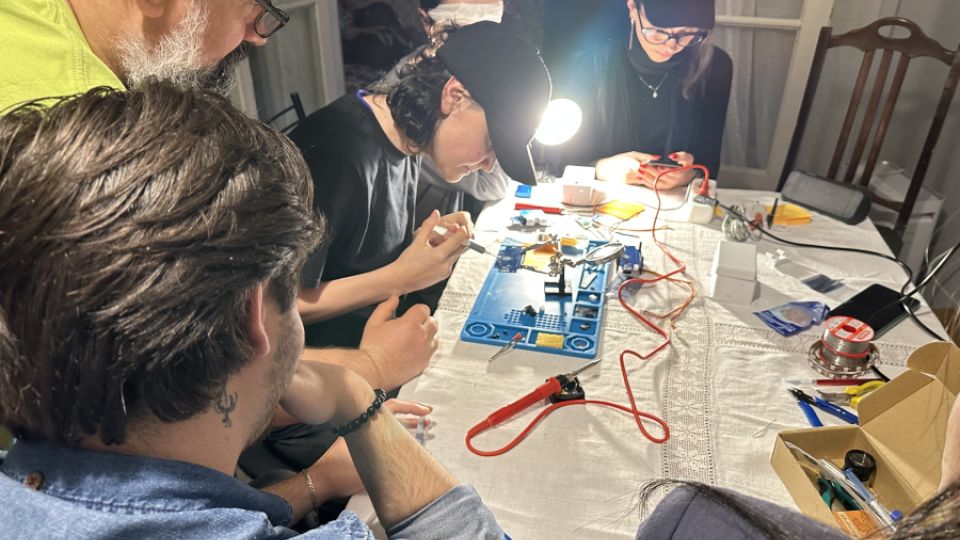TBILISI/PRAGUE - According to the World Health Organization (WHO), Tbilisi, Georgia, is among the top three European cities with the most polluted air. Nearly four thousand people die from its effects every year (1). However, accurate data is lacking, especially from smaller cities. Today, the NGOs Arnika (Czech Republic) and Green Pole (Georgia) (2) presented the first AirGE citizen air pollution monitoring station (3). By the end of the year, volunteers will have produced about three dozen of them and deployed them across Georgia. Environmental activists say thorough knowledge of the problem is the first step to solving it.
AirGE is the station's name and the entire citizen air pollution monitoring network. The stations are self-made by volunteers from the NGO Green Pole in Tbilisi. Any Georgia resident can request a station installed at their home or apartment. Volunteers in the network must ensure that the station is connected to electricity and the internet and allow Green Pole technicians to service it when needed.
According to a WHO report, 3,741 people die yearly in Tbilisi due to bad air, and the levels here are three times the level of pollutants that can be considered safe.
“Tbilisi lacks a functioning public transport system, and the technical condition of private vehicles is deplorable. Dust caused by heavy construction traffic contributes to the high level of pollution. We know virtually nothing about the situation in other cities in Georgia. The state air monitoring network draws data from only seven stations, which is totally inadequate,” explains Giorgi Jafaridze, founder of the Green Pole civic association. “In many countries around the world, citizen monitoring is helping to provide missing information. Now Georgia will also have its own network,” he adds.
The Czech NGO Arnika is also involved in the project. The Czech Republic is an example of how air pollution can be significantly reduced. In the 1980s, the air in the former Czechoslovakia was among the worst in Europe. “Although pollution is still high in the Czech Republic today, it has been radically reduced over the last thirty years,” says Martin Skalský, chairman of Arnika. “The availability of detailed environmental data is a necessary first step. Based on this data, we can start to act. We believe that involving residents in monitoring will create the conditions for their participation in solving this problem,” he said.
CLICK HERE FOR A PHOTO GALLERY OF THE STATION'S PRODUCTION
While the territory of Georgia is now covered by seven automatic measuring stations, the Czech Republic is currently monitored by two hundred. Both countries have a similar area. “After the end of the communist regime in 1989, we started from scratch. Until then, ecological information was kept secret,” says Blanka Krejčí, head of the air monitoring department of the Czech Hydrometeorological Institute (4) in the industrial city of Ostrava, who participated today as an expert in a roundtable organized on the occasion of the official presentation of the project in Tbilisi. “Political support, stable funding and a good strategy are important. Air monitoring is a long-term project; if it is not set up correctly at the beginning, we will just spend money for no purpose,” the expert shares her experience (5).
The Transition Promotion Program of the Ministry of Foreign Affairs of the Czech Republic financially supports the cooperation between Arnika and Green Pole. The Ambassador of the Czech Republic to Georgia Petr Mikyska, perceives their joint activities as meaningful. Especially in the context of current Georgian development: “I see citizen monitoring as a suitable complement to the institutionalized state monitoring of air quality. The topic is one of the priorities of the Georgian government and the EU's cooperation with Georgia under the Economic and Investment Plan (Improved Air Quality - Helping over 1 million people in Tbilisi breathe cleaner air). In this respect, the Czech Republic can offer to share its rich experience with the successful implementation of state and civic air monitoring in the capital and in other regions of Georgia. I believe that the combined efforts of the governmental and non-governmental sectors will succeed in substantially improving air quality in Georgia, hopefully with the contribution of the Czech Republic,” he concludes.

Notes:
(1) One of the biggest problems in the environmental field is air pollution. The World Health Organization (WHO) has published data on pollution in 4,300 cities in 108 countries. Research shows that virtually all European metropolises are affected by excessive pollution from microscopic dust particles (PM), which bind various toxic substances. The situation in Ankara, Turkey, Skopje, North Macedonia, and Tbilisi, Georgia, was identified by the WHO as the most critical. According to the same report, 3 741 people die each year from bad air in Georgia - levels here are three times the level of pollutants the WHO considers safe. Read more HERE. You can find the complete WHO database for 2022 HERE.
(2) Arnika is a Czech NGO that has brought people together since 2001 to fight for a better environment. Its mission is to protect nature and a healthy environment for future generations at home and worldwide. We have long advocated for less waste and hazardous substances, living rivers and diverse nature, and the right of citizens to make decisions about the environment.
Green Pole is a Georgia-based NGO with the civic movement “My City Kills Me”. The movement aims to draw attention to the issue of heavy air pollution in Georgian cities, especially Tbilisi, and the health consequences of this condition.
(3) AirGE is the name of the station and also the name of the entire citizen air pollution monitoring network. The campaign builds on Arnika's experience of assisting in establishing similar networks in Ukraine and Belarus. More about the project HERE.
(4) Czech Hydrometeorological Institute, more information HERE.
(5) Presentation by Blanka Krejčová, Czech Hydrometeorological Institute Ostrava, available HERE.







